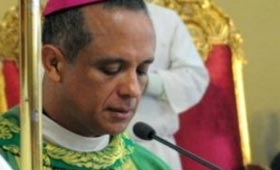An El Salvadoran bishop has claimed that a recent drop in homicides is due to the Church negotiating a truce between the country’s two main gangs, the MS-13 and Barrio 18, and that there was no government deal with these gangs.
Bishop Fabio Colindres announced in a press conference that the Church had brokered an agreement between the rivals, who agreed to cease “deadly attacks” on each other, though he said he could not guarantee how long it would last. He said that no concessions had been given by the authorities to bring about this truce, and that gang leaders had contacted him to ask him to mediate.
Last week, El Faro reported that the government had made a deal with the gangs, transferring 30 imprisoned gang leaders to lower-security prisons in exchange for a cut in violence. The transfers took place by March 11, and in the following week murders dropped by more than half, compared to the first 12 weeks of the year.
Security and Justice Minister David Munguia Payes denied this report, claiming that the drop in killings was a result of his tough security policies, and said the government was not negotiating with any gang. He did not mention any mediation being carried out by the church.
In his press conference to announce the truce, the bishop was accompanied by former congressman Raul Mijango, who says he helped mediate with the gangs. Both said that the government knew about the negotiations from the start.
InSight Crime Analysis
Something seems to have taken place to halt the violence in El Salvador — according to El Faro, there have been an average of five murders a day in the country over the last 10 days, down from 14 a day in January and February.
However, it remains unclear what has brought about this change. The bishop was unable to give details of the talks with gang members, or the names of those involved. He claimed that he could not remember the dates of the talks. El Faro points out that his description of meetings with 50 prisoners at a time clash with their experience of security policies in the maximum security facility of Zacatecoluca, where they could not meet with more than one inmate at a time.
El Faro’s editor Carlos Dada told the Committee to Protect Journalists that Munguia had held a news conference on Friday, without inviting representatives of the site, and announced that he had intelligence suggesting El Faro staff were in danger from gang reprisals following the story. Dado said that Munguia contacted the site the following day and warned them of the threat, but did not offer protection or more detailed information.
According to Dado, El Faro staff were followed and photographed by unknown individuals after publishing an investigation last year on a trafficking organization called the Texis Cartel. The editor said he suspected they might be police trying to identify the website’s sources for that story, some of whom were anonymous police officials. Munguia told the CPJ that no such trailing had been ordered by any government office.

